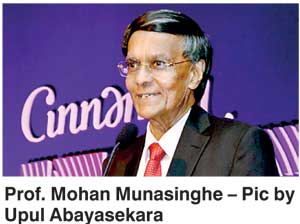Friday Feb 20, 2026
Friday Feb 20, 2026
Tuesday, 29 September 2015 01:30 - - {{hitsCtrl.values.hits}}
By Shehana Dain
Sustainable tourism must be an integral part of the overall national development strategy and not an isolated one, a top expert suggested yesterday.
The tourism industry should make decision makers see sustainable tourism as a key element of integral nation development strategy.
“Tourism and simultaneously the economic landscape in Sri Lanka today are booming. However, rapid financial growth in the world has led to multiple threats globally, which undermines sustainable development efforts and poverty alleviation. If as a community and an industry financial prosperity could be achieved without disturbing the balance in the world, that is called real development,” 2007 Noble Prize winner Inter-Governmental panel on Climate Change Vice President Mohan Munasinghe said yesterday.
He made these remarks delivering a keynote address at the ‘Future of Tourism’ summit held yesterday at the Cinnamon Lakeside.
Munasinghe also touched on the environmental crisis which has led to the global dilemma of climate change, noting this was as a result of malpractices by businesses which operate with short-term financial motives.
In his speech he urged the Government to place the tourism industry as the cornerstone to push sustainability development to the community adapting sustainomics.
Munasinghe stressed that inequality was one of the key dilemmas the world has to face. Quoting the IMF’s Christine Lagarde, he stated that the combined wealth of the 85 richest people in the world was equal to more than the wealth of the bottom 50% of people worldwide – that’s 85 people with more wealth than the poorest 3.5 billion people in the world.
According to him, the crowding of the rich has positioned the poor in a very vulnerable situation.
“With our experience with the global financial crisis, we saw that governments bailed out big banks by funding them by $ 1.75 trillion and the same Governments will chip in a few billions or millions to matters relating to humanity. Yet these banks still haven’t come out of the crisis”
“This affected the developing countries as one million jobs were lost. Governments went on to become bankrupt. This is a clear example to show that the finance pillar can be a real bubble, but I still feel the world hasn’t learnt enough from the 2008 crackdown. The rich walk over 100 million of the world population who are poor and jobless in order to get richer.”
Elaborating on how tourism as an industry can contribute to eradicate actions against humanity, Munasinghe highlighted that the responsibility isn’t focused only upon the business organisation; both ends of the industry should actively participate in the cause.
“How can we do this?” he asked. “Hoteliers can contribute to humanity aspects by undertaking CSR projects. By this I do not mean situations where some funds are shifted from one place to another. It can be done by being responsible for your actions to the community, considering wider social responsibilities. Consumers and other industry stakeholders get on with integrated external engagement.”
He further noted that the industry could follow current financial trends and conform to sustainability accounting standards by adopting a triple bottom line approach.
“Tourism, unlike many other industries, is closely related to nature. There’s an intrinsic value which goes together. Today, the tourist is well aware and demands responsible tourism. If the stakeholders do not understand this, it would definitely lead to their downfall,” he added.
He further stated that today when it comes to product or service, it’s beyond the material aspect. The 21st century consumer values the goodness concept which can be used as a part of nation branding. The satisfaction customers gain by enjoying the beauty aspect cannot be matched with any amount of printed material.
Munasinghe highlighted that the tourism industry in order to survive in the long run should harmonise with the sustainable development triangle.
“Unethical social values lead to economic mal-development which subsequently leads to unsustainable development. Therefore the tourism industry should transcend typical stakeholder participation to catalyse the business, civil society and government interactions to strengthen local, national and global governance.”
Citing an example, he noted that one of the very effective areas the industry can look at is focusing on the hot spots of a value chain, where carbon emissions are the highest.
“Look at water management, energy consumption, kitchen management and raw material usage. If you take a single hotel there’s multiple processes that need this evaluation.”
“While we can increase our forex earnings, increase infrastructure development and contribute to employment generation and local economy, it’s clear that one does not see there’s a major leakage out of host country, price hikes and even burying of local SMEs.”
Citing statistics, he stated that dependence on tourism has increased from 375,000 people to 1.5 million people and this itself shows the impact tourism has as whole on the community. The ripple affect ultimately affects us all; even the unborn infant has a part to play and a part to expect from the industry.
Social capital development, proper education and awareness of communities will significantly reduce the harm to the environment and aid sustainable development.